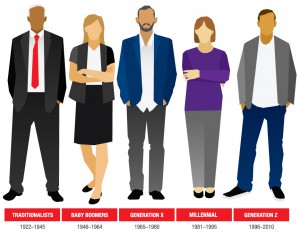07 Nov
2017
ENGAGING EMPLOYEES ACROSS GENERATIONS
By Charmaine Smith
There are five generations in the workforce today – traditionalists, baby boomers, Generation X, millennials, and Generation Z – the most generations in one workforce to date. Engaging five generations with different values and motivations is no easy task, but it’s mission critical, no matter the industry you’re in.
 According to the American Psychological Association, U.S. businesses lose nearly $300 billion a year in employee absenteeism, diminished productivity, turnover, and medical and legal expenses related to dissatisfaction and stress in the workplace. The complexities surrounding our multigenerational workforce are often dismissed or overlooked, negatively impacting employee satisfaction and decreasing productivity.
According to the American Psychological Association, U.S. businesses lose nearly $300 billion a year in employee absenteeism, diminished productivity, turnover, and medical and legal expenses related to dissatisfaction and stress in the workplace. The complexities surrounding our multigenerational workforce are often dismissed or overlooked, negatively impacting employee satisfaction and decreasing productivity.
Engagement is critical to employee satisfaction. At DAI Solutions, we believe that creating a culture of engaged employees has the extraordinary power to unleash enthusiasm and momentum for positive transformation. Before we can design, develop, and implement a strategy to create a culture of engaged employees in a multigenerational workforce, we have to take the time to understand the values, career expectations, and priorities of each generation.
Traditionalists (1922-1945) have a strong respect for authority, strictly adhere to rules, and value conformity. They believe that their duties and responsibilities in the workplace take precedence over leisure and feel that promotions are justified by seniority or time served in an organization.
Baby boomers (1946-1964) occupy the majority of upper management and executive positions and value hard work demonstrated through long hours on the job. Often viewed as “workaholics,” this generation is motivated by status, power, and incentives. The largest generation to date, baby boomers are confident and competitive, and work hard to stand out.
Generation X (1965-1980) values individual projects and minimal supervision. According to Pew Research, members of Generation X are skeptical, self-reliant, and not interested in being pampered. Unlike baby boomers, they place high importance on work-life balance and prefer an informal and fun workplace. They demand high productivity and prefer to complete projects and tasks quickly to free up personal time.
Millennials (1981-1995) are highly committed to moral and ethical principles, placing high importance on finding meaningful work and tend to gravitate toward careers they feel have a purpose. Millennials expect full and transparent communication, fast decision making, and require information to be available to them immediately.
Generation Z (1996-) doesn’t remember a world without social media and smartphones, and processes information at lightning speed. They value multiculturalism as a hallmark of who they are. Generation Z puts money and job security at the top of their list of job requirements, a reaction to maturing and coming of age during the recession. This generation is pragmatic and doesn’t view opportunities as boundless, unlike previous generations. Because of this, they are cautious in the way they make decisions and are likely to choose sensible and safe careers; however, they believe in changing rules and breaking tradition to achieve great results.
Rather than developing a unique engagement strategy for each generation, organizations should work to:
- Focus on the similar and shared values of employees, and strive to break down the walls we define as the generational divide
- Promote open and transparent communication for all employees
- Encourage traditionalists, baby boomers, and Generation X employees to mentor and share career and professional experiences rather than simply manage the millennial and Generation Z populations
- Connect careers to social impact to allow employees to feel a sense of purpose with their work
- Invest in integrated volunteering and giving programs to strengthen individual skills, teams, and leadership
Leveraging this understanding of the values, career expectations, and priorities of the current workforce enables organizations to create work environments and job offerings that win over talent and influence them to stay, ultimately promoting employee satisfaction, and increasing productivity and profits.





